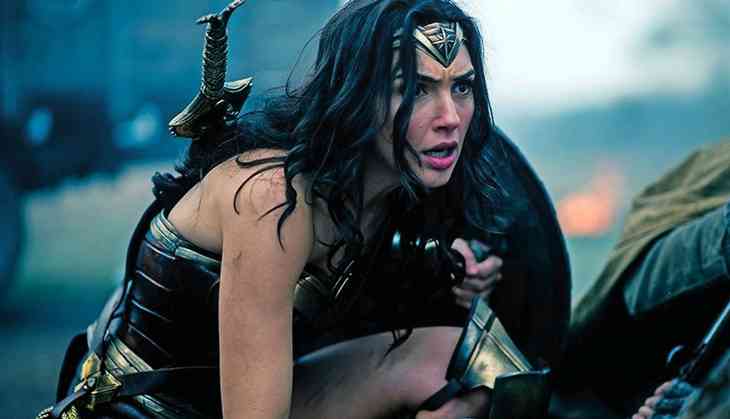Wonder Woman movie review: A film where the real superpower is mansplaining

When Wonder Woman first appeared in Batman V Superman, she was arguably the lone highlight in an otherwise boring movie. Having managed to upstage DC's two biggest superheroes in just a minute-long cameo, it's little wonder then that Wonder Woman has been the most anticipated addition to the DC Extended Universe.
However, Wonder Woman's allure doesn't stem solely from her superhero schtick. Indeed, most of her charm is a result of what she represents. Her arrival, the first big screen female superhero caper since 2005's Elektra, was meant to signal a giant step forward in Hollywood's treatment of female characters.
Women would no longer be mere eye candy, existing as love interests or plot devices. Finally, they would be front and centre; real, layered characters tasked with carrying a plot. And Wonder Woman would lead this charge, a larger-than-life icon of female power. The added bonus of director Patty Jenkins only underlined this intention.
Or so we thought.
While Wonder Woman can be entertaining (in a vapid, generic superhero movie way), it fails to live up to the hopes and expectations that most of us had for the film. Instead of the strong, independent princess of Themyscira, what we get is a naive, at times hysterical woman, who is the butt of the joke for most of the movie.
The plot
The movie follows Diana (Gal Gadot), as she leaves her home Themyscira, the mythical island of the Amazons, to end a major war and thereby thwart Ares, the god of war's attempts to end the world.
Set in 1918, the conflict Diana's trying to avert is, rather predictably, an Anglo-German one, with our winsome heroine on the side of the British, obviously. Aiding her in her endeavour is Steve Trevor (Chris Pine), a spy for the British whom Diana saves after his plane crash lands off the coast of Themyscira.
With the help of Trevor's motley crew of comrades, the two travel deep into German territory in an attempt to kill the war-hungry General Luddendorff (Danny Huston), a man Diana believes to be Ares, and thus stop the war.
The movie does a passable job of executing all the usual superhero tropes, from the Nazi bad guys, the zany, multi ethnic support staff, and, of course, trying to save the world. But Wonder Woman was meant to be more than just a run-of-the-mill superhero movie, and it doesn't manage that. Not by a long shot.
Feminism wept
The movie's feminist credentials are evident in the first few minutes of the movie. Diana's Amazons seem like a race that epitomises all that feminism seeks to be – strong, capable, independent, egalitarian and graceful. Robin Wright's Antiope is fierce, while her sister, Diana's mother, Hippolyta is fair and just.
However, once Diana leaves Themyscira, it seems like any pretense of feminism is also left behind on the island. In fact, no sooner does she touch ground in England than we're made to sit through a makeover scene, because what screams feminism more than trying on new clothes...
But this is just the start. From the point Diana leaves the island, the film begins poking fun at her. Her initial wonder at the 'world of man' is the source for some obvious, not particularly funny jokes. While the audience may quickly tire of these, the movie doesn't, with most of the film's humour stemming from the supporting cast's amusement at Diana's lack of exposure. Never mind that she could snap them like twigs.
When the movie's men aren't objectifying or laughing at Diana, they're usually chastising her or mansplaining things. In fact, Diana's ideas are shot down for almost the entirety of the movie in favour of the plans of her male sidekicks.
Not content with just having male characters talk down to her, the movie actually shows Diana as a character desperately in need of all the mansplaining. She is hysterical where she should be convincing, blundering when the situation calls for tact, and an insufferable bleeding heart who couldn't be rational if she was a fraction.
The movie doesn't even trust her to anchor the action scenes on her own, despite her fight scenes looking amazing. Even her final showdown with Ares isn't hers alone, with the fight being annoyingly interspersed with Trevor's heroics as he ultimately saves the world. That's right, Wonder Woman doesn't save the world in her own movie, her toyboy does!
Almost cartoonish
While other films in the DC Extended Universe have been gritty and realistic, Wonder Woman is exempted from this treatment. Instead, it gets a sanitised, more kid-friendly treatment. The primary villains, Luddendorff and Doctor Poison, seem more like Scooby Doo villains than genuine threats. At one point, as they poison a room full of German scientists, the two cackle comically at their villainy.
This isn't the only instance of the film's preference for silliness over substance either. Wonder Woman's crew on her mission into Germany consists of Sameer, a “master of disguise”, Charlie, a drunk Scottish sniper, and Chief, a native American for whom the war is a business opportunity. None of them do very much to help Diana apart from providing diversity. What they do manage, however, is to make the mission seem patently absurd.
Still, none of this is as strange as the movie's decision to have Chief lovingly hug the Nazis in the immediate aftermath of Diana's victory of Ares. Though maybe they were all just glad the movie was finally ending.
Should you see it?
Looking for the usual mindless superhero fare? You'll probably love it. But if you've bought in to the hype and hoopla that's been riding on Wonder Woman, prepare to be sorely disappointed.
Rating: 2/5


